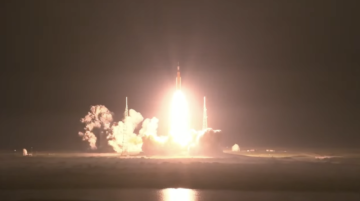From Black Panther’s Ramonda to Thor’s Frigga, the Marvel Cinematic Universe has no shortage of badass mothers. With Ms. Marvel, the MCU has taken this dedication to all things maternal to another level.
For starters, there’s Muneeba, the mother of protagonist Kamala Khan. But let’s not forget that Sana, Kamala’s nani (maternal grandmother), is herself Muneeba’s mother. Kamala and Muneeba’s mother-daughter relationship is cleverly mirrored in the relationship between Muneeba and Sana, and through this exploration of motherhood, Ms. Marvel turns Kamala’s superpowers into a vehicle, allowing the show to feature more specific — and highly personal — matters from Kamala’s life.
What’s more, by foregrounding this family dynamic, it becomes natural for the show to shed light on difficult topics like generational trauma and the assimilation of South Asian families in the United States, which many South Asian viewers like myself might find resonant. As a first-generation Indian American Muslim woman, I’m still learning about the hardships that my mother and grandmother faced as South Asian women, not unlike Kamala in Ms. Marvel. By unfolding the relationships between Kamala, Muneeba, and Sana, Ms. Marvel explores motherhood as a superpower of its own.
That’s because Kamala’s superpowers as a djinn are tied to her maternal lineage. Sana, who gifted Kamala the bangle that activated her powers, is immediately supportive of Kamala’s abilities. The last person to wear the bangle was Aisha, Sana’s mother and Kamala Khan’s great grandmother, who vanished during the partition of India and Pakistan.
We’re first introduced to Sana in person in Episode 4 after Kamala and Muneeba travel to Pakistan to visit her. When she pulls Kamala Khan in for a giant hug at the airport, I was immediately reminded of my own nani, who I only met once on a family trip to India when I was four. I can’t help but think of my maternal lineage while watching the dynamics unfold between Kamala, Muneeba, and Sana, and the generational trauma that follows Kamala and Muneeba across borders.
Episodes 4 and 5 also bring to light a topic that I’ve never seen discussed on Western television before: the partition of India and Pakistan in 1947. In Ms. Marvel, Sana and her family were among the millions of people displaced during the partition. Almost every South Asian family has ties to the partition, whether it’s family members who remember the partition themselves or stories that have been passed down from generation to generation.

Credit: Courtesy of Marvel Studios.
The partition resulted in three significant events in South Asian history: the designation of India as a Hindu-majority state, the designation of Pakistan as a Muslim-majority state, and the British finally leaving the Indian subcontinent after nearly a century’s rule. At least one million people were killed, while 15 million people were displaced while moving across borders. Ms. Marvel’s portrayal of the partition not only draws awareness to an extremely important historical event, but also reflects the experiences of the older generation of South Asians who still remember the partition, and validates their memories by not presenting them from a European point of view.
By the end of episode 5, Muneeba finds out about Kamala’s powers and realizes that the stories that Sana told her about their maternal history with superpowers are all true. When Muneeba and Sana watch in awe as Kamala uses her powers, it’s clear that the three generations of Kamala’s maternal lineage have a better understanding of each other as mothers and daughters – and have moved one step closer to healing their generational trauma.












